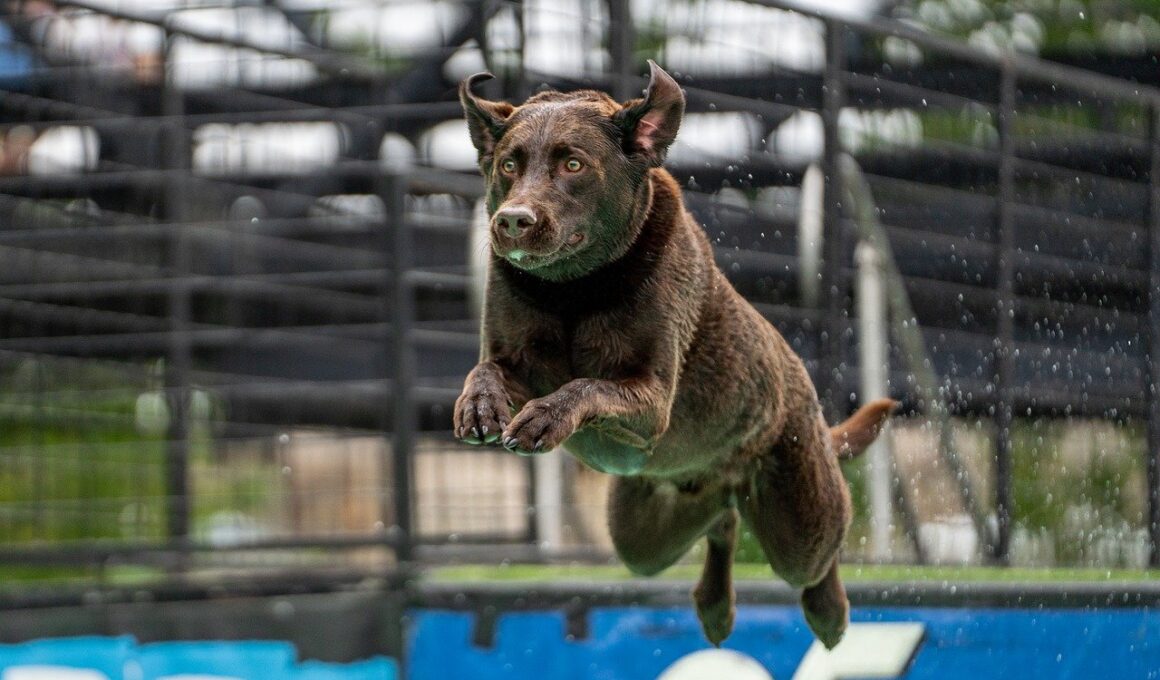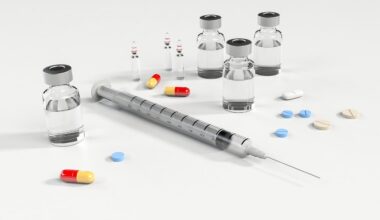Nutrition Tips to Support Your Dog’s Water Activities
When engaging in water activities, it’s essential to prioritize the nutrition of your dog. Proper nutrition can enhance their energy levels and overall performance. Ensure your dog has a balanced diet, rich in protein and healthy fats. This will not only fuel their excursions but also support muscle development and recovery after intense play. Foods such as chicken, fish, and lamb are excellent protein sources. Additionally, including omega-3 fatty acids found in flaxseed or fish oils can improve joint health, a crucial factor for dogs frequently swimming. Hydration is paramount; always provide fresh water before and after water activities to keep your dog hydrated. Avoid high-calorie snacks during playtime, as they may cause digestive issues. Instead, opt for easily digestible treats that won’t weigh your dog down. Consider consulting your veterinarian for a specific dietary plan, especially if your dog is involved in frequent water activities. Their professional guidance can help you choose the right food and supplements, ensuring your pet remains healthy and energetic. Overall, a well-balanced diet is the foundation for a safe and enjoyable water experience for your dog.
Another significant aspect of your dog’s nutrition is timing. Feed your dog their meals at least a couple of hours before engaging in water activities. This practice helps prevent any discomfort while swimming and allows for better energy utilization. Immediately post-swim, provide a small, nutrient-rich snack to replenish lost energy. Foods like sweet potatoes can be beneficial; they offer carbohydrates and vitamins, promoting recovery. Plus, maintaining your dog’s weight is crucial, particularly if they engage in frequent aquatic activities. Overweight dogs may struggle in the water, risking their safety. Monitor your dog’s body condition and adjust their diet as needed, ensuring they remain active and healthy. Furthermore, some dogs may require an electrolyte boost after intense swimming sessions. Consider offering a hydration solution designed for pets during hot days and extended play. These solutions can help replace minerals lost through sweat and activity. Always ensure this supplement is safe and suitable for your dog’s breed and health status. Following these nutrition tips will not only improve your dog’s performance but also enhance their enjoyment during water play.
Avoiding Common Water-Related Health Issues
Ensuring your dog is well-nourished can help prevent common health issues associated with water activities. Dogs can suffer from water intoxication, which occurs when they ingest excessive amounts of water while swimming. Keeping your dog hydrated with fresh water before swimming can help alleviate this risk. Additionally, avoid exercising them to the point of exhaustion. Providing a balanced diet with essential nutrients will also support bodily functions, mitigating risks of any complications. Nutrition supports mental sharpness too; a focused dog will be safer while swimming, responding better to commands. Regular vet check-ups can identify underlying health issues, enabling more tailored dietary adjustments. Consult your vet about preventative measures regarding water-related illnesses, such as giardia, particularly after swimming in natural bodies of water. Eating high-quality food fortified with probiotics may strengthen your dog’s gut microbiome, decreasing the likelihood of digestive upset post-swim. Regularly monitoring your dog’s health and weight, ensuring they are in peak physical condition, helps guarantee a safer water experience. By taking these preventive steps and incorporating targeted nutrition, you can help your dog enjoy the water without health concerns.
Another potential health concern that can arise from water play is skin irritations or infections. Frequent water exposure can often lead to skin issues, particularly in dogs with sensitive skin. A balanced diet containing fatty acids can aid in maintaining a healthy skin and coat, providing a natural defense against irritants and infections. Consider options rich in omega-6 fatty acids like sunflower oil, which contributes to skin moisture and repair. Additionally, regularly checking your dog’s ears after swimming can prevent infections due to excess moisture trapped in the ear canals. A diet high in vitamin E can bolster the immune system, promoting recovery if infections occur. Keep your dog’s coat groomed, removing debris that may contribute to irritation. Furthermore, remember to rinse their coat with fresh water after swimming, removing any chemicals or saltwater that might lead to dermatological issues. The right supplements can also support skin health; consult your vet for recommendations specific to your dog’s needs. Overall, focusing on comprehensive dietary strategies will significantly reduce the risks of water-related skin problems.
Fun Water-Friendly Treats
Having fun and creating positive associations with water is crucial for your dog’s happiness during water play. Incorporating enticing water-friendly treats can enhance this experience for them. Homemade frozen treats made with natural ingredients such as peanut butter and pumpkin can serve as a delightful reward after swimming. Simply mix these ingredients with yogurt or mashed bananas, pour them into molds, and freeze. These treats are not only delicious but also healthy. Peanut butter provides healthy fats and protein, while pumpkin boasts fiber that aids digestion. You can also create edible toys that float, making retrieval games exciting. This playful engagement reinforces their love for the water while keeping them active. Alternatively, store-bought options designed specifically for dogs can be beneficial, ensuring they are safe and nutritious. Always check the ingredient list for quality assurance and avoid any treats with artificial additives. Rewarding your dog with these specially curated treats will promote their enjoyment of water activities, enhancing their experience while maintaining healthy practices. By providing wholesome options, you contribute positively to your dog’s overall water safety and enjoyment.
Incorporating a variety of nutrition strategies for your dog can yield substantial benefits when aquatic adventures become routine. Regularly changing their meals can help keep their diet diverse and appealing, incorporating different protein sources and vegetables. Consider alternating between chicken, beef, lamb, and fish to ensure they receive a broad range of nutrients. Vegetables like carrots and peas can be excellent supplements, providing vitamins and minerals essential for their health. This variety also helps maintain their interest in their diet, promoting healthier eating habits. Remember to introduce new foods gradually to avoid any digestive upset. You may also consider supplementing with vitamins or enzymes, especially if your dog is highly active. Talk to your veterinarian for suggestions tailored to your dog’s specific needs. Supplements can support joint health, vital for swimming dogs, such as glucosamine and chondroitin. Regularly re-evaluate your dog’s dietary needs based on their activity level and health. Adjusting their nutrition plan can enhance their energy and wellness, forming a solid foundation for a safe and enjoyable relationship with water activities.
Conclusion: Prioritizing Nutrition for a Safer Water Experience
Prioritizing your dog’s nutritional needs is a vital component of ensuring their safety during water activities. A well-rounded diet supports overall health, stamina, and recovery post-exercise. Achieving the right balance of proteins, fats, and carbohydrates is crucial in helping your dog thrive in water. Always monitor their hydration levels and consider using supplements if necessary. Work with a veterinarian to construct a personalized nutritional plan addressing your dog’s needs based on their activity level and age. Frequent water activities can pose risks, but with the right precautions and nutrition, you can significantly mitigate these. Celebrate your dog’s love for water by reinforcing this enthusiasm with nutritious treats and consistent care. Keeping their diet varied and engaging is essential in maintaining their health and happiness. Ultimately, the joy and bonding experiences derived from water play can form a cherished part of your pet’s life, enhancing your relationship. Commitment to good nutrition will ensure that your dog enjoys a safe, energetic, and delightful experience every time they hit the water.
Nutrition Tips to Support Your Dog’s Water Activities
When engaging in water activities, it’s essential to prioritize the nutrition of your dog. Proper nutrition can enhance their energy levels and overall performance. Ensure your dog has a balanced diet, rich in protein and healthy fats. This will not only fuel their excursions but also support muscle development and recovery after intense play. Foods such as chicken, fish, and lamb are excellent protein sources. Additionally, including omega-3 fatty acids found in flaxseed or fish oils can improve joint health, a crucial factor for dogs frequently swimming. Hydration is paramount; always provide fresh water before and after water activities to keep your dog hydrated. Avoid high-calorie snacks during playtime, as they may cause digestive issues. Instead, opt for easily digestible treats that won’t weigh your dog down. Consider consulting your veterinarian for a specific dietary plan, especially if your dog is involved in frequent water activities. Their professional guidance can help you choose the right food and supplements, ensuring your pet remains healthy and energetic. Overall, a well-balanced diet is the foundation for a safe and enjoyable water experience for your dog.


